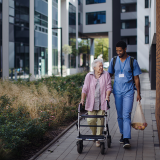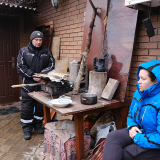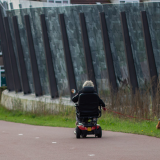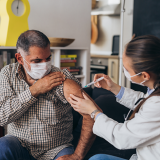
Elamistingimused ja elukvaliteet
Elamistingimused ja elukvaliteet on üks kuuest põhitegevusest Eurofoundi 2021.–2024. aasta tööprogrammis. Eurofound jätkab Euroopa inimeste elamistingimuste parandamisega seotud põhiaspektide kaardistamist ja analüüsimist, sh kogudes teavet selle kohta, kuid nad tajuvad elu- ja ühiskonna kvaliteeti. Kuivõrd COVID-19 pandeemia ja sellele järgnenud majanduskriis on inimeste elu sügavalt mõjutanud, uurib Eurofound selle kriisi mõju ELi kodanikele eri eluetappidel.
Aastatel 2021–2024 pakub Eurofoundi uurimistegevus põhjalikku ülevaadet ELis esinevatest väljakutsetest ja väljavaadetest elamistingimuste ja elukvaliteedi valdkonnas ning erinevate algatuste rollist, mille eesmärk on leevendada eri kodanikerühmade sotsiaalprobleeme. Erilist huvi pakuvad eakatelele ja hoolekandele, noortele ning nende sotsiaalsele kaasamisele ja sotsiaalsele liikuvusele avalduv mõju ning kriisi erinevad tagajärjed meestele ja naistele .
ELi avalikel teenustel oli oluline roll COVID-19 kriisile reageerimisel, kuid selles valdkonnas esines ka suuri probleeme, mistõttu neid teenuseid hinnatakse üksikasjalikumalt, keskendudes sellistele aspektidele nagu kvaliteet, juurdepääs ja taskukohasus. Varasematest järeldustest ilmnes, et kriisil oli teatud rühmadele – olenevalt vanusest, hoolduskohustusest ning töö- ja eraelu tasakaalust – ebaproportsionaalne mõju ning Eurofound kavatseb seda põhjalikumalt analüüsida.
Koostöös Euroopa Soolise Võrdõiguslikkuse Instituudiga (EIGE) kavatseb Eurofound uurida mitmemõõtmelist soolist ebavõrdsust, uurides COVID-19 kriisi mõju meestele ja naistele seoses tööhõives osalemise, materiaalsete elamistingimuste ja heaoluga, et teha kindlaks erinevused ja hinnata selle mõju soolisele ebavõrdsusele.
- Infograafik: Elutingimused ja elukvaliteet ELis
„ Kaasaegse Euroopa institutsioonide vastu suurema usalduse loomise põhiteguriks on olnud avalike teenuste kvaliteet ning see on eriti oluline praeguste ja tulevaste väljakutsetega toimetulekul. Kvaliteetsed teenused on ka valdkond, kus tuleks tegeleda innovatsiooniga, eriti digitaalsetele ja keskkonnahoidlikumatele teenustele üleminekuga, et olla tulevikus valmis sellisteks ohtudeks nagu pandeemia.“
Tadas Leončikas, vanem teadusjuht, sotsiaalpoliitika üksus






























